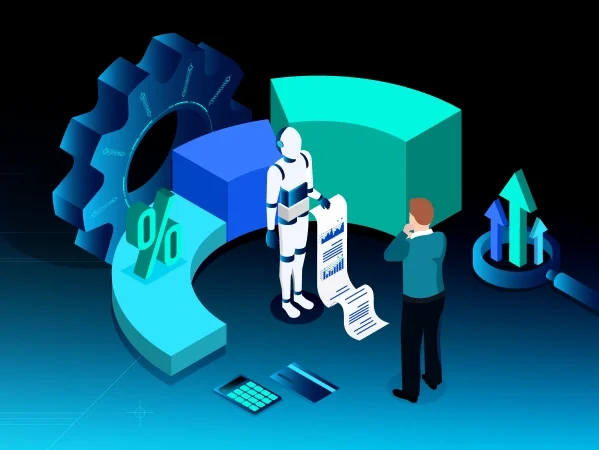Marketing is one sector of business operations where experts predict generative artificial intelligence (genAI) could bring about dramatic changes. According to McKinsey research, marketing and sales are the business functions that will see the most significant economic impact from implementing AI-ruled systems. Therefore, it is unsurprising that the global value of AI marketing will increase from $12 billion in 2020 to 108 billion in 2028.
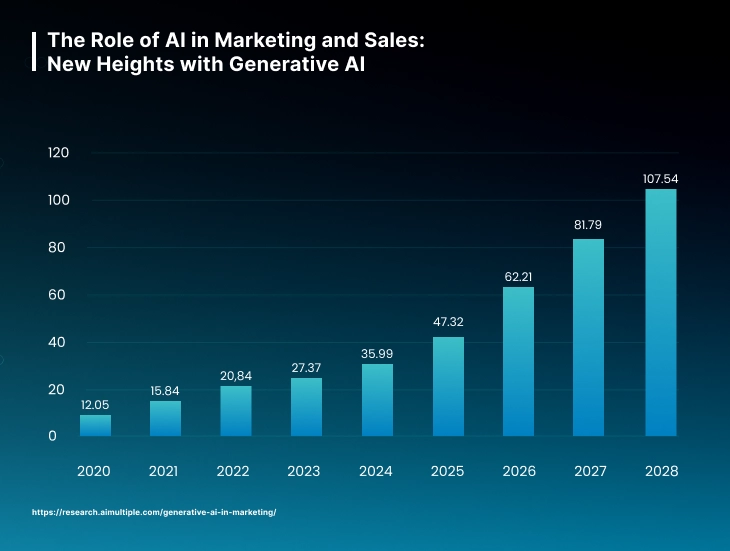
In other words, if you are a marketer and are not yet using AI-backed systems, you are missing out on the profits of the most advanced techniques.
This guide will discuss why adding AI-backed structures to advertising performance is essential, how to begin utilizing AI, and what problems you may encounter.
The Definition of GenAI in Marketing
GenAI in marketing is one of the modifications of artificial intelligence, which mainly concentrates on composing content, not just data analysis. It specifically includes words, musical notes, design, audio and video for advertising.
It utilizes deep learning mechanisms that process large volumes of data and may perform various objectives in a human-like manner.
Unlike other AI-based algorithms, which are built to solve a single problem, genI has a massive list of capabilities. You must specify a text-based prompt to make original content that resembles the learning information.
By the beginning of 2024, Forrester predicts that 10% of Fortune 500 firms will compose AI-powered content.
The Importance of AI in Marketing
Artificial intelligence is a potent instrument for marketers that may be utilized to solve many problems. Recent research from Salesforce and YouGov demonstrates that 53% of advertising experts believe genAI is a game changer. Marketers surveyed also evaluated that such techniques could save them about 5 hours of activity each week, which equates to about one month per year. Let’s consider other benefits of artificial intelligence in marketing:
- Fast and informed decision-making: advertising departments with advanced AI-backed instruments track the effectiveness of their efforts in near real-time and regularly correct their plans. AI-ruled advertising structures process insights and suggest actions based on sentiment analysis.
- Increased ROI: AI-backed programs assist marketers in finding actionable data that relies on campaign insights. These tools enable you to define the optimal channels to buy advertising and its ideal placement based on studying customer behavior.
- Expanding the potential of customer relationship management (CRM): advanced techniques help advertising departments refine CRM by utilizing AI for marketing automation of routine activities, e.g., client data preparation. They also decrease the risk of human fault by delivering personalized notifications to buyers.
Recently, many marketers are faced with a massive volume of insights when creating a campaign. AI may perform predictive analytics, processing large databases in seconds with lightning-fast and successful machine learning (ML) structures. They utilize precise information about future client behavior to compose individualized content and define patterns in data.
How to Adopt AI in Your Marketing Activity?
Before introducing AI into your business, you must carefully plan its use in advertising campaigns and procedures. It will assist you in preventing costly complications and maximize your genAI investment in the short term. If you decide to adopt AI in advertising, there are several factors to remember:
- Identify goals: begin by defining sectors that can be refined, e.g., segmentation. Then, choose precise performance metrics to assist you in evaluating your AI marketing campaign’s success.
- Select optimal data sources: marketers must collect vast volumes of information before utilizing AI in advertising. Such insights will assist the marketing application in determining user preferences, market conditions and other vital conditions. A firm may obtain this data from its CRM, past marketing campaigns, or website data. You can also add third-party insights, e.g., location insights, weather data and other external conditions.
- Training and fine-tuning the generative model: effective application of AI-backed structures is impossible without training and fine-tuning them. Professionals can create more personalized and effective marketing materials by continually improving the platform through iteration. A trained model can compose ads, social media materials, and targeted email campaigns that appeal to the target audience.
- Evaluate and optimize generated marketing content: genAI can benefit marketers by automating the content generation process. It is essential to track engagement, click-through rates, and conversion parameters. Regular evaluation and optimization maximize the effect of AI in advertising campaigns.
- Privacy policy: ensure your AI-backed solution stays within the acceptable use of data to personalize your experience. Make sure privacy norms are defined and programmed into your advertising solutions.
Most marketers believe AI-ruled advertising instruments are most effective when they are synchronized with current commercial tactics rather than utilized as a separate system. AI-backed advertising instruments create the potential to optimize diverse categories of sales procedures that are nowadays too labor-intensive (e.g., data processing) or have a high risk of error, e.g., attribution.
Main Elements of AI-Backed Marketing Solutions
AI plays a significant role in marketing by helping professionals collaborate with clients. Robust advertising structures combine sophisticated artificial intelligence systems to give you the data you need to succeed. Let’s analyze these technologies in more detail:
- Machine learning (ML) applies static technologies when processing social insights to obtain accurate data about client experience and user sentiment. ML platforms can analyze texts, extract topics, perform semantic clustering, and several other tasks. Such models may process big data and update automatically, essential to provide scaling processes and reduce costs across the technology stack.
- Natural language processing (NLP) allows your AI-backed system to semantically and contextually interpret the information obtained. It mixes linguistic and statistical instruments, enabling you to study many publications, reviews, and documents and get valuable insights. This provides access to a broad audience for information campaigns, a closer connection with the buyer and maximum impact from advertising on social networks.
- Semantic search: such algorithms assist in comprehending the meaning of a sentence or lexical string. Such engines select suitable keywords and classify them based on a semantic cluster. Understanding how strong your firm is compared to other firms in your field and ensuring it meets your criteria lets you adjust your generative AI marketing plans to reach your lengthy commercial aims.
Many advertising departments lack workers with the necessary data processing and artificial intelligence knowledge, making it challenging to work with significant volumes of information and provide insights. You can deal with third parties to help gather and process data to teach your tools.
Key Problems Associated with AI
When dealing with genAI, you must remember you are dealing with something still in development. It means that despite all how AI-backed instruments will help you, they may present you with specific difficulties. Be prepared to face the following obstacles:
- Information security: AI marketing allows enterprises to collect and store large amounts of user data, which raises concerns about its processing and protection. Businesses must adopt strict security measures and continually explain to counterparties why they collect and utilize their insights to avoid information leakage.
- Synchronization with current programs: some AI-backed solutions may have difficulty integrating with your software and cause crashes. Ask the supplier about the possibility of integrating the structure before implementation.
- Ethical consideration: AI-ruled personalized marketing may raise ethical concerns about privacy violations, manipulation of insights, accuracy, and the ability to influence client behavior. It is vital to strictly adhere to the ethical norms of AI to guarantee the comfort of clients and partners.
Adding AI-backed systems to your marketing efforts requires technical education and skills that may not be available in-house. To obtain the maximum profit from such an investment, partner with AI-backed solutions providers like Metadialog, who are committed to your success and provide resources to guarantee your groups are well-trained to utilize such platforms.
Exciting Use Cases of AI in Marketing
By 2030, AI-backed marketing will account for approximately 45% of the total world financial structure. It may be achieved through several methods, including improving commodities based on the existing database, personalizing services and seeking leverage to influence consumer demand. Let’s discuss how to use AI for marketing.
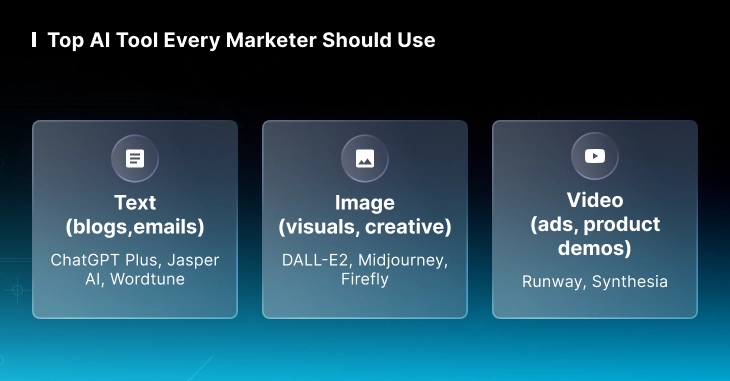
Text and content generation
Text AI relies on NLP mechanisms and large language models (LLMs) to automate material creation. Such structures utilize significant databases with existing content to explore writing patterns and styles. In addition to generating non-standard ideas, text composed by AI can be used for other tasks:
- Creating material for emails, social media profiles or blog posts.
- Writing scripts and lines for videos.
- Creating accurate descriptions of commodities.
ChatGPT Plus, Jasper AI, and Wordtune are the most potent text generators.
Video and picture creation
GenAI automates image creation with deep learning frameworks and generative adversarial networks (GANs). There are different options on how to use such tools:
- Creating realistic product shots for online stores, social networks and other promotional materials.
- Development of critical visual elements of the firm, including logos.
- Release of original advertising.
- AI-backed video programs assist in creating high-quality commercials and demo clips about commodities.
Some of the most famous genAI instruments to create pictures are DALL-E and Midjourney.
Search engine optimization
GenAI enables you to identify the most relevant keywords and phrases to utilize in your advertising campaigns by analyzing a significant volume of information and identifying patterns in user behavior. Other use cases of genAI solutions SEO implementation:
- Suggesting ideas for topics to write content
- Keyword research
- Finding the correct name
- Grouping of search targets
- Formation of content structure
Some leading AI marketing tools in this area are SEMRush and Surfer SEO.
Interaction with clients
You can automate customer collaborations with AI-backed structures, as conversational platforms have demonstrated they may instantly identify user requests and respond to them faster than human agents. GenAI automates customer service through the following systems:
- Chatbots and messaging apps that are available 24/7.
- Automate email by providing answers to the most common questions.
- Self-service portals that offer users personalized advice based on queries and interaction history.
With multilingual support and localization capabilities, genAI serves a broad cross-section of society.
Actual Examples of Utilizing AI in Marketing
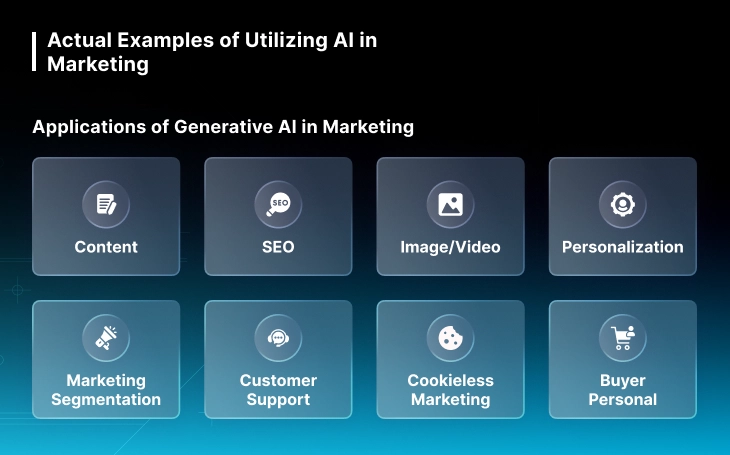
Utilizing AI in advertising can seem daunting due to the common misconception machines will soon displace humans and leave us without jobs. GenAI may improve your marketing efforts, cut expenses, and save time when used correctly and creatively. Let’s look at some real examples:
- Nutella: The corporation wanted to stand out in terms of packaging and make its soy products more memorable. The company delegated such work to the agency Ogilvy Italia. They utilized genAI and a dozen templates to produce 7 million unique labels. It is how Nutella Unica was born.
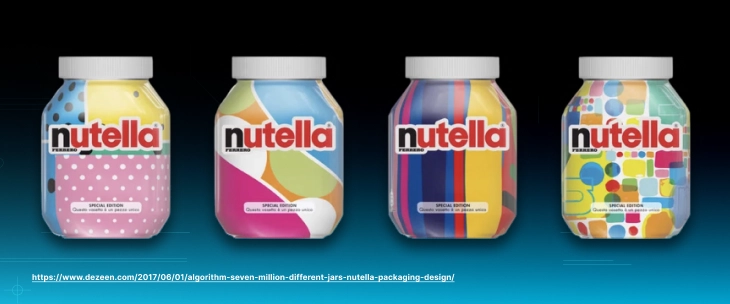
- Cyber Inc.: the firm introduced the idea to make content even more enjoyable with Synthesia AI, a solution to create videos with AI-backed instruments. Cyber Inc. wanted to quickly scale through content generation and expand its target audience by creating videos in different languages. She also used AI to create an avatar to replace the actor. As expected, Cyber Inc. could release videos twice as fast and enter new markets earlier than planned.
The potential of genAI is limitless, and every year, the scope of the application of AI for sales prospecting and the improvement of advertising activities is expanding. Many more discoveries await us in computer vision, AI-backed digital assistants, and predictive AI.
Final Words
GenAI remains a relatively novel technology, but it is quickly gaining traction in the marketing industry. It will likely provide even more benefits as it is actively developed and becomes more complex.
According to Gartner’s projections, by the year 2025, artificial intelligence is expected to be utilized by major corporations for generating roughly 30% of their outbound marketing messages. Their calculations suggest approximately 90% of the content in a major film released in 2030 will come from AI-backed sources.
You’re on the right track if you’re considering adding such modern technology to your marketing team. At the first stage, we recommend contacting MetaDialog specialists for consultations on genAI.
Our service organization approaches its work with the same responsibility and attention to innovation as manufacturing enterprises. Our significant experience in the industry confirms our success in creating our digital products.
Whether you decide to use the latest genAI platforms or need personalized services tailored to your business needs, we have the skills, knowledge and tools to offer a full range of development services. Let’s build quality products together!
